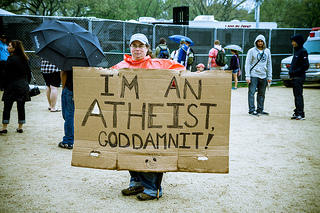|
This weeks perspective could not be more appropriate to the time of year. How are Christians supposed to relate to the world at Easter? We're celebrating what the world thinks is a delusion. How do we, should we respond?
0 Comments
 “Piglet noticed that even though he had a Very Small Heart, it could hold a rather large amount of Gratitude.” [A.A. Milne, Winnie-the-Pooh] Feeling gratitude and not expressing it is like wrapping a present and not giving it. [William Arthur Ward] I would maintain that thanks are the highest form of thought, and that gratitude is happiness doubled by wonder. [Gilbert K. Chesterton]
 Blessed are the cracked for they shall let in the light (Groucho Marx) It's amazing how the cracked can give rise to illumination. It's grace that is the light shining through our cracks to illuminate life *despite* our failings. I'm cracked, I know that. So how do I know if the my thoughts are merely products of the cracks? You see, reason and logic are about the only foundations we have to build anything that has strength. Opinion and feelings come and go as readily as I eat, drink, and go to the toilet. Reason, on the other hand, is testable in so far as we are true to the logic frameworks that are independent of our mood. What is theology but a coat rack to hang your understanding on? It has form and function, and we try hanging our ideas on it. Some fall off, some barely stay on, and others hook on well. The ones that hang securely do not necessarily mean we have the right coat rack in all respects -- we need to have a frame where everything can find a hook of consistent understanding. The God of the old testament and the God of the new testament, judgment and mercy, grace and justice, these should all be able to hang comfortably on our theological coat rack. Likewise, issues of homosexuality, the death penalty, abortion, poverty, suffering, ambition, success, war, and so on and so on, should all have a place in our theology where they are rationally at ease with everything else. The danger is when we arbitrarily change our theology because it offends our sensibilities. The moment we do so, we find something else falls off our frame. But when the theology is right, all hangs secure and any remaining discomfort we have with is our problem ... not reason to change the theology. Rather, we need to examine ourselves in honesty and ask why we don't like it. Examine your theology. Is it consistent with God's Word? Be true to that which is eternal, not that which is transitory.  As we started 2013, we desired to hear as a church what God might be saying to us about where we go and what we do. The council felt that we were at a decision point and need to understand our directions. In part this was the motivation behind the recent 5 week sermon series on prayer. At the end of the 5 weeks, we had a mid week meeting open to all, where we spent the time in worship and listening to God. This was well attended by home groups and others from StB. This blog post summarizes the evening and what we think God may be saying to us. Three dominant themes repeatedly emerged, independently yet in harmony.
In addition, it is worth noting that at the last church council meeting everyone seemed to resonate to the phrase "get our house in order before moving on". This paints a collective idea of "Be prepared". These are challenging words. To be prepared may be threatening to some, but the joy is that God is saying be prepared because he will cause something to happen. One way to think of this is, its as if Jesus is asking himself the question ... "are they now prepared to face what they will encounter?" I don't think the answer is yet a solid "yes". We need to consider if it's time for each and everyone of us to get serious about some hard choices in relation to StB which are the heart of God for us. The passage of Matthew 25:1-13 (although it's about the end times) has much to say about being prepared. So let us rejoice that God seeks to work in us and through us, and pray that we as a church will understand and move into what Jesus has prepared.  The "perspectives" this week comes by way of a group effort from Barry's home group ... so this time its only one article reflecting multiple views ... WHAT IF I DON’T LIKE WHAT I’M BEING TOLD ABOUT GOD? When this topic arose in our house church there were so many keen blog volunteers we decided to tackle it as a group. God, especially in the Old Testament, can appear to be cruel rather than a God of love. We read of nations being wiped out, harsh punishment for disobedience, Abraham being instructed to take his only son up the mountain to sacrifice him, something I’ve always found quite barbaric. Do we just ignore the parts of the Bible we don’t like? We discussed slavery and the seemingly unfair treatment of Hagar and Ishmael – okay, so we digress at times – and why God demands so much praise from us; he is a jealous God, wishing to be exalted and come first in our lives, and how annoying these character traits are in human beings. We said faith and trust are difficult issues as humans, largely because we can’t trust each other. So what do we do when we don’t like what we’re being told about God? We agreed this is where house church comes in. We can ask questions in a safe environment, and when we don’t reach a conclusion (we seldom do) it’s a relief to get the questions out there. We can keep reading the Bible, asking for fresh insight on well-known passages; keep asking questions while accepting that God would not be God if we could understand everything about him. |
Important: The views expressed on this blog do not necessarily reflect the official position of our church
Like to Write? Archives
June 2015
|






 RSS Feed
RSS Feed

